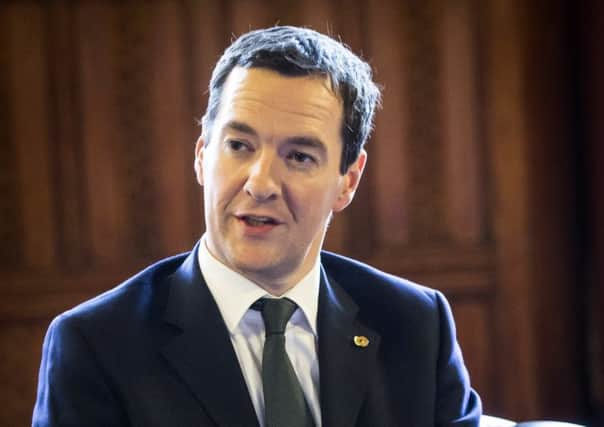George Osborne ditches key budget goal in wake of Brexit vote


The Chancellor had placed the goal at the heart of his austerity measures in previous budgets but has now warned Britain will no longer achieve such a budget surplus by 2020.
Mr Osborne said the UK economy was bracing itself for a “significant negative shock” following last week’s vote to leave the European Union.
Advertisement
Hide AdAdvertisement
Hide AdHe had pledged to deliver in line with Office for Budget Responsibility (OBR) forecasts, which predicted the UK to have a budget surplus of £10.4bn in 2019/20 and £11bn the year after.
However, speaking at the Greater Manchester Chamber of Commerce, he said: “Now, as the governor of the Bank of England said yesterday, the referendum result is as expected likely to lead to a significant negative shock for the British economy.
“How we respond will determine the impact on people’s jobs and on economic growth. The Bank of England can support demand.
“The government must provide fiscal credibility, so we will continue to be tough on the deficit but we must be realistic about achieving a surplus by the end of this decade.
“This is precisely the flexibility that our rules provide for. And we need to reduce uncertainty by moving as quickly as possible to a new relationship with Europe and being super competitive, open for business and free trading. That is the plan and we must set to it.”
Home Secretary Theresa May, who has thrown her hat into the ring to become the next Conservative Party leader and prime minister, said on Thursday that she was ready to ditch Mr Osborne’s target of a budget surplus by the end of the Parliament if it was necessary to avoid tax rises.
Responding to the Chancellor’s announcement, leadership candidate Michael Gove said: “It does seem to me to be ... sensible to think about what it is that we need to do in the light, perhaps, of OBR forecasts which are due to come, in order to make sure that we bring the deficit down but do so in an orderly way in response to events.
“Let’s wait and see what the OBR says, but I think the Chancellor is absolutely right to insist on flexibility.”
Advertisement
Hide AdAdvertisement
Hide AdShadow chancellor John McDonnell said: “I welcome the Chancellor’s decision to finally listen to the calls made by myself and Jeremy Corbyn over the last nine months to drop his failed surplus target.”
He added: “It is only a shame he was not realistic sooner, as under Jeremy Corbyn Labour has been unequivocal in its opposition to failed Tory austerity.”
Stewart Hosie MP, the SNP economy spokesman, said that the Tory government had now “lost all credibility” on the economy and warned that while he welcomed the Chancellor’s decision to abandon the “highly damaging and unnecessary” budget surplus target, Brexit should not be used as an excuse to pursue further “counterproductive austerity policies”.
He said: “For the second time in just six years Chancellor George Osborne has been forced to abandon his own target on the deficit – the central and defining focus of his economic policy – knowing he stood no chance of meeting it.
“This is a government that has held back economic growth with its austerity policies, and has repeatedly failed on key economic indicators including the debt, deficit, borrowing, productivity, trade and exports.”
Paul Johnson, director of the Institute for Fiscal Studies, said Mr Osborne’s announcement meant more austerity spending cuts and tax rises in the next parliament.
“You can’t borrow forever. So we will have a few more years of more borrowing but my guess is that this is not the end of austerity,” he said.
“This means that austerity will go on longer because we will probably have the spending cuts and tax rises right through the 2020s to pay for this.
Advertisement
Hide AdAdvertisement
Hide Ad“You are going to have to have the pain later on to repay the additional borrowing that we are going to need to do in the short run.”
Meanwhile, London’s premier share index was buoyed by Mr Osborne’s decision to abandon his surplus target on the back of the Bank of England governor’s announcement that interest rates will be cut in the summer.
Tony Cross of Trustnet Direct said: “The FTSE-100 has just posted its best weekly gain in almost eight years as the prospect of fresh stimulus measures from the Bank of England and news that the UK Government was abandoning its deficit target continued to buoy sentiment.”
According to official figures, the Government borrowed £74.9bn for the complete financial year ending in March 2016, meaning it overshot its annual target of £72.2bn by £2.7bn.
The OBR was predicting borrowing to shrink to £55.5bn in 2016-17, £38.8bn in 2017-18 and £21.4bn in 2018-19.
However, public sector new borrowing excluding public sector banks hit a worse-than-expected £9.7bn in May, despite dropping by £0.4bn compared with the same month last year.
Meanwhile, the Chancellor is already showing signs of being blown off course this year, with borrowing in the current financial year hitting £17.9bn, a £0.2bn jump compared with 2015.
During the campaign Mr Osborne argued that Britain should remain in the EU, and had estimated that a vote to leave would hurt public finances to the tune of £30bn.
Advertisement
Hide AdAdvertisement
Hide AdHe said Britain must “reduce uncertainty by moving as quickly as possible to a new relationship with Europe and being super competitive, open for business and free trading.
“That’s the plan and we must set to it.”